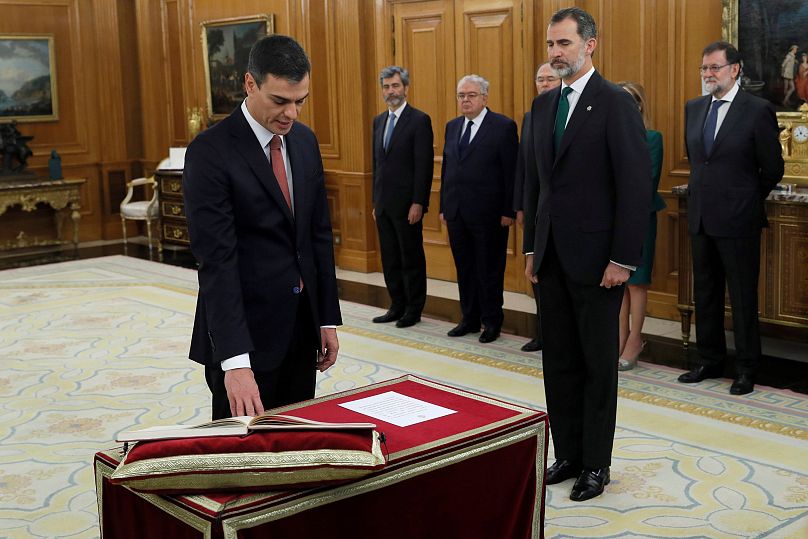Euronews speaks to Spanish politics expert Paul Kennedy about what the changes mean for the Catalonia dispute, what policies Sanchez is likely to pursue and how long he will last in power.
Spanish socialist Pedro Sanchez was sworn in as prime minister on Saturday after veteran conservative Mariano Rajoy lost a no-confidence vote in the wake of a corruption scandal.
Euronews' Alice Cuddy spoke to Spanish politics expert Paul Kennedy, author of "The Spanish Socialist Party and the Modernisation of Spain", about what the changes mean for the Catalonia dispute, what policies Sanchez is likely to pursue and how long he will last in power.
How did we get here?
I don’t think anybody saw this coming. I should stress that it’s got nothing to do with the Socialist Party’s capacity — they’ve had a hard time recently. It’s more to do with the fact that the corruption which has affected the Popular Party in the government is to such an extent that it was just impossible to go on.
People had just had enough and that means that strange things have happened. It means that we have a government who have lost a vote of confidence due to its seeming incapacity to put an end to egregious wrongdoing and corrupt practices.
What has Sanchez been like as Socialist Party leader?
Sanchez has been leader since 2014. He’s had a hard time frankly over the last four years. He’s probably spent more time arguing with leaders within his own party than anything else.
He resigned in 2016 when he was unhappy about going along with his party’s decision to abstain in a vote to make Mariano Rajoy the prime minister.
He disappeared, he came back and stood in the primary elections, and to everyone’s surprise he beat the favourite. He’s tenacious. He came back.
He’s somebody who has probably benefited from having such a difficult time — he’s gained the confidence of a lot of Spanish people with what has happened.
What policies will he pursue?
The obvious one is having no tolerance for corruption. The Socialist Party itself has been involved in a very bad corruption case down in the south, in Andalusia, so there’s a possibility that a couple of very prominent socialist figures may well be indicted or imprisoned. The Socialist Party has to show itself as having no tolerance whatsoever for corruption, even when it affects their own rank.
The next one I guess would be something to do with the labour market. Rajoy’s government put through a labour reform in 2012 which was quite tough. Sanchez has been on record suggesting that it was far too stringent. However, Spain has enjoyed quite a decent recovery over the last few years and changing the labour reform may affect confidence in Spain’s economy overall.
How difficult will it be for him to rule?
The fact remains that he only has 84 MPs. He’s not even an MP himself — he resigned his seat amid all these arguments within the party back in 2016 and has not come back.
The other thing is Polemos, who will be the next biggest party within the government. There is no love lost between the two party leaders.
I couldn’t envisage a more difficult environment in which a government has to try to thrive.
I think we’re likely to see him go grey over the next year or two because it really is likely to be very challenging.
What will it mean for Catalonia? Will he be beholden to the pro-independence parties who offered their support in the no-confidence vote?
Sanchez stood shoulder to shoulder with Rajoy in terms of rejecting the referendum. His idea has been that the previous government allowed things to get to a very bad situation whereby there was very little chance of dialogue or negotiation.
He’ll be seeking to try to return to the negotiating table. Not in any way to make the possibility of Catalan independence any more feasible but at least to show that Madrid is listening to concerns. And there could be lesser things carried out in terms of a new financial law — an economic agreement for Catalonia could be worked out in the next year or so.
How long will his time in power last?
I wouldn’t envisage more than a year or so. He’s mentioned that he’d like to finish up this particular term in office which would take us through to 2020. But I’d be very surprised if it lasted that long.
Paul Kennedy is a lecturer in Spanish and European Studies at the University of Bath. This Q&A has been adapted from an interview and edited for clarity.
The opinions expressed in View articles do not reflect those of Euronews.












